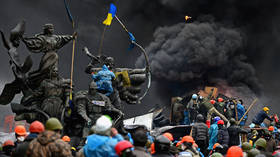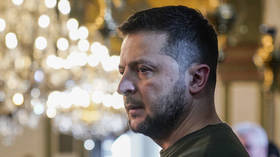Maidan snipers: The founding myth of ‘new’ Ukraine has been proven to be a lie. Why is the West silent?
Recent findings in a lengthy case have cast doubt on the very roots of the current Ukraine crisis

Earlier this month, a district court in Kiev announced its findings in a case that had dragged on since 2015, handing down sentences to five former officers of the long-dissolved 'Berkut' police unit. The ex-police grouping become internationally known during the 2013/14 protests which culminated with the violent 'Maidan.'
Charged with involvement in the shooting of anti-government protesters by snipers in the center of the Ukrainian capital on February 20, 2014, four of the accused – three of them in absentia – were found guilty and sentenced to terms between five years and life. One was acquitted.
Politically, this was, or should have been, Ukraine’s single most important trial since independence in 1991. The judges closed – at least for now as appeals have already been announced – the country's attempt to come to terms judicially with the darkest moment of what has been called a “revolution,” as well as a “coup”: the fall of the government of former President Viktor Yanukovich under pressure from initially peaceful – then violent – street protests and Western meddling. The events producing regime change and geopolitical re-orientation unfolded over three months, but the killing of almost 50 protesters that February was a crucial tipping point.
The case quickly became known as the “snipers’ massacre” or the “Maidan massacre.” The shootings were squarely blamed on Yanukovich and his administration and seemed to rule out domestic compromise and confirm Western and Ukrainian pro-insurgent narratives, casting the crisis as a national and democratic freedom struggle against a corrupt and oppressive regime beholden to Moscow. Neither the disproportionate role of an aggressive and manipulative Ukrainian far right nor the ruthless geopolitics of the West had a place in this framing. Within days after the killings, a last attempt to stop the spiral of escalation by an internationally mediated agreement failed, Yanukovych fled to Russia, and Moscow's troops were on the move in Crimea.
Then things got worse. Clashes between Kiev’s new government and rebels in Donbass evolved into an initially intense, then mostly slow-burn, regional civil war, including limited Russian interventions. The best chance for peace, the 2015 Minsk 2 Agreement, was sabotaged systematically by Kiev and its Western supporters, and, after February 2022, Ukraine became the theater of a proxy war of the collective West against Russia. The West and Ukraine are now likely to lose this conflict at immense cost in lives and wealth, mostly to Ukraine. International tension is extremely high, trust has evaporated, and meaningful communication is almost impossible.
Ukraine and the world could be in a much better place if the last days of February 2014 had played out differently, allowing for the compromise already negotiated between Ukraine’s government and the insurgents to take hold. The Maidan Massacre was not the only but the single most important shove toward an ever-widening conflict, especially as the dominant Western narrative about the killings has remained the same, blaming only the old regime and rejecting any challenge to the narrative as a pro-Russian “information war.” Here was the perfect story, in short, to emotionally legitimize not only support but uncritical backing for Kiev, the rejection and sabotage of any concessions to Ukraine’s domestic rebels in the East, and vilifying any effective cooperation with Moscow.
But what if we were not told the truth about the killings? That is the key claim advanced by Canadian-Ukrainian political scientist Ivan Katchanovski. Katchanovski (who also recently exposed the scandal around the honoring of a Waffen-SS veteran by the Canadian parliament) has long argued that “the Maidan massacre was a false-flag mass killing of … protestors and … police in order to seize power in Ukraine. It was conducted with the involvement of oligarchic and far-right elements of the Maidan opposition using concealed groups of Maidan snipers in Maidan-controlled buildings.”
The rich detail of Katchanovski’s findings cannot be reproduced here, but three points should be noted: Snipers belonging to the insurgents’ side started shooting at the police on the morning of February 20; key positions, such as in the Hotel Ukraina and a conservatory, from which these policemen were attacked and later Maidan protesters as well, were and remained under the control of insurgent units (not the police); and after 9.00 am, protesters, too, were shot by insurgent snipers (again: not by the police).
In sum, two things happened, according to Katchanovski’s findings: Insurgent snipers first shot at the police to provoke an escalation, and then, in addition, even killed protesters – that is, those on their own side. At the same time, Katchanovski does not rule out the possibility that the police also shot protesters. But his careful analysis of video and other evidence shows that many victims, likely the majority, were targeted by insurgent shooters.
Katchanovski has come to these conclusions through years-long, rigorous, and exhaustive forensic research, as summarized in his peer-reviewed article “The ‘Snipers’ Massacre’ on the Maidan in Ukraine” in Cogent Social Sciences, an academic journal published by Taylor and Francis. He has not been the only one reaching such or similar results, but his work is the most thorough and important independent investigation. Clearly, that is why, due to its political implications, he has had to withstand being smeared as a “conspiracy theorist” and pro-Kremlin information warrior; his work has been censored; and he has suffered severe retaliation by attempts at professional and social marginalization and the pseudo-legal confiscation of his family’s property in Ukraine.
Ukrainian courts are not politically independent. Judges, whatever their own views or professional ethics, work under the threat of ostracism and violence from Ukraine’s far right (at least). And yet, as Katchanovski has pointed out, buried in the million-word findings of the recent verdict, the court has recognized several facts that confirm his interpretation of the Maidan Massacre, including the following: four police officers were killed and 39 wounded by insurgent snipers; snipers shot from buildings under insurgent control; and it cannot be ruled out that eight victims were killed and 20 injured by “unknown” perpetrators who were not from the police.
While Katchanovski is to be admired for his research and steadfastness, what is especially important here is that the long backlash against his research is a symptom of something larger that is badly amiss in both Ukraine and the West. Even now, the Ukrainian information war outlet Euromaidan Press, for instance, still combines a personal attack on Katchanovski with disinforming its readers, claiming that the verdict somehow contradicts his findings (which are, by the way, badly misrepresented).
The opposite is the case.
This is just the latest example of a deep culture of disinformation and self-disinformation that has taken root in the West. While Western elites may well lie deliberately much of the time, substantial parts of the Western media, it seems, have come to not only believe these lies – or those of favorites, clients, and allies – but to defend them with a vigor that betrays psychological investment.
The emotionally-charged reality denial around Hillary Clinton’s richly-deserved defeat in the US election of 2016 (“Russiagate”), the bizarre doublethink regarding Western forces (and/or Ukraine) blowing up Nord Stream (thereby committing an act of war among “allies” and of eco-terrorism), Israel’s “right to defend itself” interpreted as the permission to commit crimes against humanity with Western support – all are instances of a form of collective self-indulgence. Too many people in the West still claiming to be the world’s “value” guardian practice lying and lying to themselves as if it were their special birthright.
Yet these lies and fiercely guarded illusions corrupt individuals and politics, polarize societies, disrupt international relations and, last but not least, cost lives – thousands, tens of thousands, and, in the case of Ukraine by now, hundreds of thousands. Conflict is a normal part of human life, and, to some extent, inevitable.
Driving yourself insane with dishonesty is not. And it certainly does not help keep the peace.
The statements, views and opinions expressed in this column are solely those of the author and do not necessarily represent those of RT.
https://www.rt.com/russia/586192-maidan-snipers-ukraine-kiev/



0 Comments:
Post a Comment
Subscribe to Post Comments [Atom]
<< Home